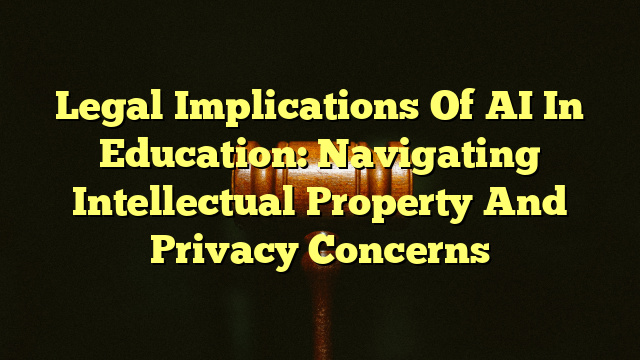Table of Contents
Legal Implications of Artificial Intelligence
Artificial Intelligence (AI) is rapidly transforming various industries, including education. While AI offers numerous benefits, it also raises several legal concerns that need to be addressed. This article explores the legal implications of AI in education, focusing on intellectual property and privacy concerns.
Impact on Intellectual Property Law
AI technologies can generate and process vast amounts of data, leading to potential intellectual property issues. For example, AI algorithms can create original works, such as artwork or music, which raises questions about copyright ownership. Additionally, AI can analyze and interpret copyrighted materials, potentially infringing on existing intellectual property rights.
To navigate these challenges, it is crucial to establish clear guidelines and regulations regarding AI-generated content. This includes determining who owns the rights to AI-generated works and how to protect existing intellectual property from unauthorized use by AI systems.
Impact on Privacy Rights
AI in education often involves collecting and analyzing vast amounts of personal data from students. This raises concerns about privacy rights and the protection of sensitive information. Educational institutions must ensure that they comply with relevant data protection laws and obtain informed consent from students and parents before collecting and using their data.
Furthermore, AI systems must be designed with privacy in mind, incorporating measures such as data anonymization and encryption to safeguard personal information. Regular audits and assessments should be conducted to ensure compliance with privacy regulations.
Legal Concerns in the Workplace
AI technologies are also being implemented in the workplace, which gives rise to legal concerns. For example, AI systems may be used for employee monitoring, raising questions about privacy and surveillance. Employers must strike a balance between utilizing AI for productivity and efficiency while respecting employees’ privacy rights.
Additionally, AI can impact employment and labor laws. As AI systems automate certain tasks, job roles may change or become obsolete, leading to potential legal implications such as retraining obligations or the need to redefine job descriptions and responsibilities.
Conclusion
As AI continues to advance in the education sector, it is essential to address the legal implications it brings. Intellectual property and privacy concerns are among the key areas that require attention. Clear guidelines and regulations must be established to protect intellectual property rights and ensure the privacy and security of personal data. Additionally, legal concerns in the workplace should be carefully considered to strike a balance between AI adoption and safeguarding employees’ rights.


Navigate IP and privacy to ensure legal AI in education.